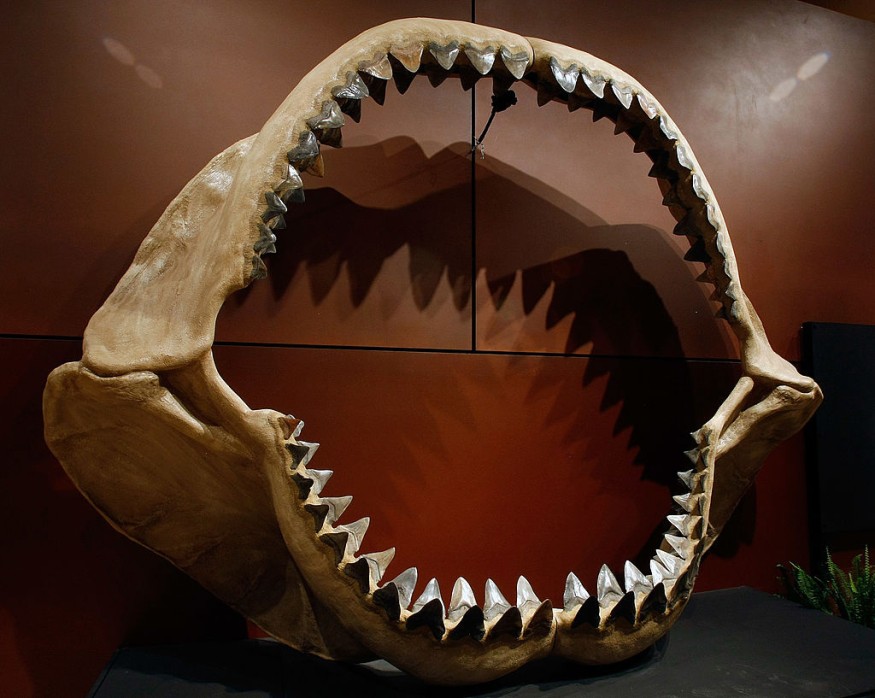
DePaul University paleobiology professor Kenshu Shimada and colleagues analyzed the size patterns of Otodus megalodon to understand how these ancient sharks grew larger than the modern ones.
Megalodon sharks are estimated to live about 3.6 million years ago, but they might not have been always so large. The new study proposed that their sizes may have varied depending on where they lived. They found that megalodon grew larger in cooler environments.
One of the world's largest set of shark jaws comprised of about 180 fossil teeth from the prehistoric species, Carcharocles megalodon, which grew to the size of a school bus, is displayed at the Venetian Resort Hotel Casino September 30, 2009 in Las Vegas, Nevada.
Megalodon's Teeth Reveal Its True Size
Megalodon sharks are believed to have evolved during the Neogene Period about 20 million years ago. The sharks have been one of the top predators of the ocean for millions of years, although megalodons are estimated to grow up to 59 feet (18 meters) long which makes them the largest fish to ever lived.
However, no one has ever seen them and scientists only make estimates based on the species' tooth size. According to History, nearly all megalodon fossils had teeth measuring up to 18 centimeters long or three times the size of a great white shark's tooth.
The position of the tooth in a shark's mouth is used to estimate the size of the megalodon. Florida Museum reported that the equations used to estimate their size were updated last year using a complete set of teeth.
Prior to its discovery, the estimated sizes could vary wildly. Some megalodon teeth discovered were significantly smaller than the average and believed to be nursery ground for megalodons. A 2020 study showed that nurseries could be found in Spain, the USA, and Panama.
ALSO READ: Megalodon Babies Were 6-Feet-Long Due To In-Womb Cannibalism
Bergmann's Rule Explains Megalodon Sharks' Size in Colder Environments
Previous estimates of the megalodon shark's sizes were only taken using lateral teeth, which likely produce uncertainty. So, the team reassessed the findings using the upper anterior teeth to produce better estimates and use new methods of estimating body length, such as Bergmann's rule.
It was introduced by German biologist Carl Bergmann in the mid-1800s which explains that larger animals thrive in cooler climates because it helps them retain heat more efficiently, Phys.org reported. Given that megalodon nurseries are located near the equator, researchers think that is why those yield smaller Megalodon teeth.
In their study, titled "Revisiting Body Size Trends and Nursery Areas of the Neogene Megatooth Shark, Otodus Megalodon (Lamniformes: Otodontidae), Reveals Bergmann's Rule Possibly Enhanced Its Gigantism in Cooler Waters" published in the journal Historical Biology, researchers explained that smaller megalodon teeth may be a product of individual sharks attaining smaller body sizes due to warmer waters.
Study co-author Martin Becker said that this idea came from a casual conversation of the researchers wondering where do large fish live. He added that the results have important implications in understanding how climate change is accelerating marine habitat shifts to polar latitudes in apex predators, like sharks.
In conclusion, scientists found that not all geographically different Megalodons grew to gigantic sizes equally. The belief that they could have grown up to 59 feet (18 meters) long should only be applied to populations inhabiting cooler environments.
RELATED ARTICLE : Unbelievable! Study Reveals Actual Size of Megalodon Shark, One of the Largest Fish to Ever Exist
Check out more news and information on Sharks and Megalodon in Science Times.










